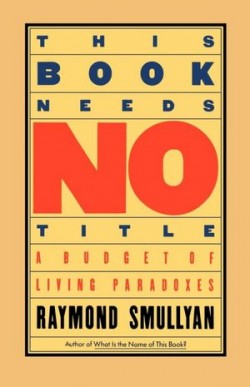 Some years back Neil Gaiman and Terry Pratchett joined forces for a comic novel about the apocalypse called Good Omens. Almost immediately, fans of this jeu d’esprit, in which the newly born AntiChrist is mixed up at the hospital with an ordinary baby, clamored for a sequel. Though it seems unlikely that such a book will ever be written, the two authors do have a title—664: The Neighbor of the Beast.
Some years back Neil Gaiman and Terry Pratchett joined forces for a comic novel about the apocalypse called Good Omens. Almost immediately, fans of this jeu d’esprit, in which the newly born AntiChrist is mixed up at the hospital with an ordinary baby, clamored for a sequel. Though it seems unlikely that such a book will ever be written, the two authors do have a title—664: The Neighbor of the Beast.
Just saying that title over in my mind makes me smile. It’s funny, ingenious, and unforgettable. You can hardly ask for more.
Book titles are definitely tricky. I’ve brought out several essay collections, but I really like only two of the titles I came up with: Bound to Please and Classics for Pleasure. The first involves triple word-play, one of the meanings being quite naughty; the other recalls a vinyl record label from years gone by. Both, however, underscore my conviction that we don’t read for high-minded reasons. We read for aesthetic, emotional, and intellectual excitement.
Sometimes, on long car trips or while awake at 3 A.M., I make up mental lists, and one of my go-to categories is Favorite Book and Story Titles. Many of them, as it happens, are also among my very favorite novels and stories, period. Now, without question, my all-time No. 1 title is Persuasion, Jane Austen’s great novel about second chances. Here are a baker’s dozen of others, restricting myself to English and American authors:
The Last Good Kiss by James Crumley
“Casting the Runes” by M. R. James
A History of English Prose Rhythm by George Saintsbury
The Well at the World’s End by William Morris
“By the Waters of Babylon” by Stephen Vincent Benét
Captain Blood by Rafael Sabatini
An Armful of Warm Girl by W. M Spackman
You’ve Had Your Time by Anthony Burgess
Pavane by Keith Roberts
Trent’s Last Case by E.C. Bentley
The Man Who Was Thursday by G.K. Chesterton
Sanctuary by William Faulkner
Naked Once More by Elizabeth Peters
Looking over the list, I note that I gravitate to concise, even one-word titles, so long as they provide a frisson of wistfulness or bravado or humor. In my younger days I favored much more poetic phrases like Tender is the Night and Appointment in Samarra, but these now seem just a tad melodramatic.
Organizations, pieces of music, and art works obviously have titles too. For instance, I don’t think you can find a better name for a newspaper than the Youngstown Vindicator. By contrast, all those Posts and Times and Tribunes seem utterly bland. Consider, too, the thrilling nicknames for Carl Nielsen’s fourth symphony, The Inextinguishable, and Mahler’s second, The Resurrection. Two of my most beloved records are of Elizabeth Schwarzkopf singing Richard Strauss’s Four Last Songs and Leontyne Price performing Samuel Barber’s Knoxville: Summer of 1915—haunting titles, even more haunting music. My favorite painting, by Watteau, just happens to come with a wonderful name: The Embarkation for Cythera.
Many of the classics in the American Songbook bear tenderly evocative titles: “Anything Goes,” “They Can’t Take That Away From Me,” “Smoke Gets in Your Eyes,” “Embraceable You.” I think the most romantic of them all, by far, is “The Way You Look Tonight.” Then there’s that great musical library of love gone wrong—country and western songs—which gives us, among many others, “Ring of Fire,” “I’m So Lonesome I Could Cry,” and Patsy Cline’s immortal ballad, “Faded Love.”
But back to books: Perhaps the cleverest of all titles, befitting a Taoist logician who loves paradox and puzzles, are two by Raymond Smullyan: What Is the Name of This Book? and This Book Needs No Title. Both take their origin, I suspect, from Denis Diderot’s 18th-century short story “Ceci n’est pas un conte,” that is, “This Is Not a Story”—which only goes to show, as if there were any doubt, that many philosophers are cut-ups at heart. Still, whatever Diderot’s work may or may not be, this really is a weekly column, and it’s time to stop.
What are your favorite titles of books, stories, or poems? Let us know below.


